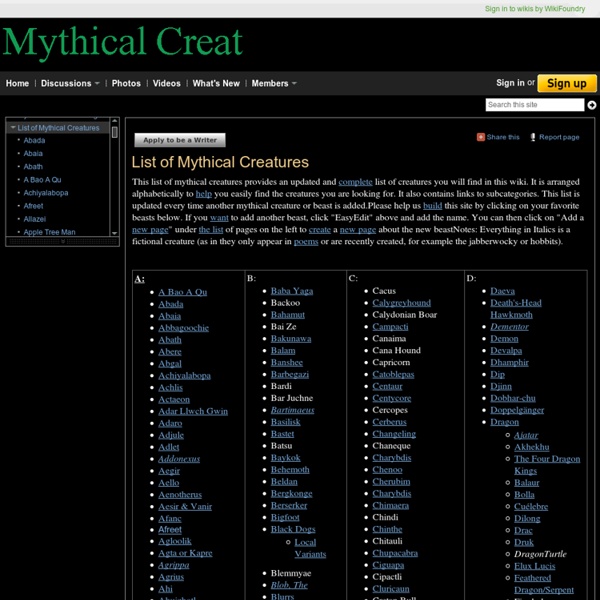



Theoi: Legendary Greek Creatures See also CATEGORIES IN THE BESTIARY (an illustrated index). Greek myth and legend is filled with a wide variety of monsters and creatures ranging from Dragons, Giants, Demons and Ghosts, to multiformed creatures such as the Sphinx, Minotaur, Centaurs, Manticores and Griffins.There were also many fabulous animals such as the Nemean Lion, golden-fleeced Ram and winged horse Pegasus, not to mention the creatures of legend such as the Phoenix, Unicorns (Monocerata) . Even amongst the tribes of man, myth spoke of strange peoples inhabiting the far reaches of the earth such as the hopping Umbrella-Foots, the one-eyed Arimaspians, the Dog-Headed men, and the puny Pygmies. AMPHISBAENAE see Beasts, African AUTOMOTONS (Automotones) Creatures crafted out of metal and endowed with life by the smith-god Hephaestus. BULLS, BRONZE (Tauroi Khalkeoi) Four fire-breathing, bronze bulls which Hephaestus crafted for King Aeetes of Colchis. BASILISCI see Beasts, African CATOBLEPAS see Beasts, African
A Timeline of World Civilizations for Mythology - dummies Part of Mythology For Dummies Cheat Sheet Mythology seeks to explain the world and thus reflects the culture, events, and history of the societies that create the stories handed down as myths. Egypt’s Nile River and its cycle of overflowing its banks leaving fertile ground as it receded became the basis for Egyptian religion that demanded that the people help the gods prevent anything from interfering with the cycle. Myths form around the founding of cities, including Athens and Rome — about 10,000 to 2,500 years ago, respectively — and the founding of civilizations, including the creation myths passed down in virtually every culture. Chinese and Native American myths account for astrological occurrences as well as for more earth-bound events such as the Toltec invasion of the Mexican city of Teotihuacan in 900 CE. Famous poems, such as Beowulf and the Saga of the Volsungs are combinations of history and legend.
List of legendary creatures This is a list of legendary creatures from various historical mythologies. Entries include species of legendary creature and unique creatures, but not individuals of a particular species. A[edit] B[edit] C[edit] D[edit] E[edit] F[edit] G[edit] H[edit] I[edit] J[edit] K[edit] L[edit] M[edit] N[edit] O[edit] P[edit] Q[edit] R[edit] S[edit] T[edit] U[edit] V[edit] W[edit] X[edit] Y[edit] Z[edit] See also[edit] The Evolutionary Tree of Religion - Signs and symbols of cults, gangs and secret societies A brilliant infographic on the evolution of the world’s main religions was posted to Reddit a couple of days ago. It turns out the user/project Human Odyssey, or Simon E. Davis, has also made other comprehensive infographics on subjects such as Sacred Symbols of the Stone Age (below) and Secret Ciphers. Have a look at his public Facebook page for more infographics.
List of Greek mythological creatures The following is a list of creatures from Greek mythology. The list does not include gods and other divine and semi-divine figures (see List of Greek mythological figures). Mythological monsters[edit] Greek myth includes many monstrous beings: Mythical animals[edit] These animals possess some fantastic attribute. Giants[edit] Enormous and monstrous human-like creatures. Dragons[edit] The dragons of Greek mythology were serpentine monsters. Drakons[edit] Drakons ("δράκους" in Greek, "dracones" in Latin) were giant serpents, sometimes possessing multiple heads or able to breathe fire, but most just spit deadly venom. The Laconian Drakon was one of the most fearsome of all the drakons. Cetea[edit] Cetea were sea monsters. Automatons[edit] Automatons or Colossi, were men, animals and monsters crafted out of metal and made animate in order to perform various tasks.
Soul-Guidance Devas/Nature Spirits The Higher Developed Devas Angel-Devas These beings, usually called angels, archangels and so on, are creative intelligences building our world. They know how to manipulate ethereal substances into ever more crystallized forms of which the end result is physical matter. They build vehicles for every life form. They do not have free will, but are very powerful in what they do. They can create sounds in the ethereal worlds that have a positive effect on humans and their environment. There are devas which encompass more abstract ideas or concepts like power, healing, music, peace, education. The following, The Deva of Stone, is an example of a cosmic deva at work, a deva where you would least expect it. The Deva of Stone Nature is full of paradox, in that as you seek contact with what you consider a lower form of life, you in fact contact a more universal being. Classification of the Angels The Cherubim (Ophanim or Galgalim) regulate and equilibrate the primordial chaos. Evil Devas 1. 2. 3. 4.